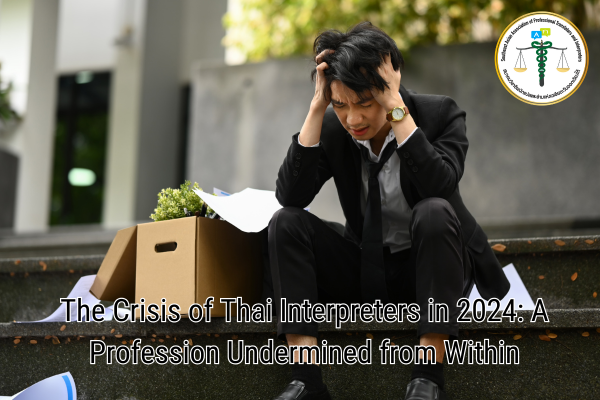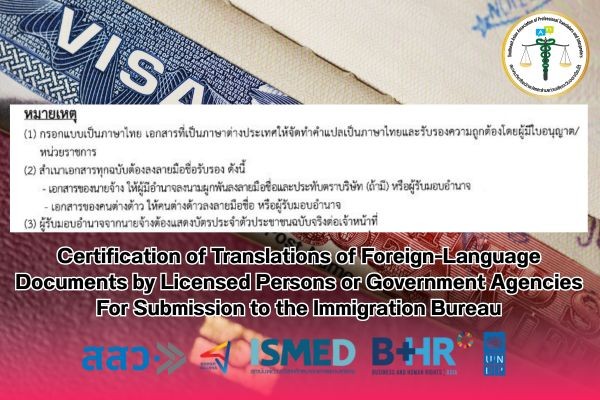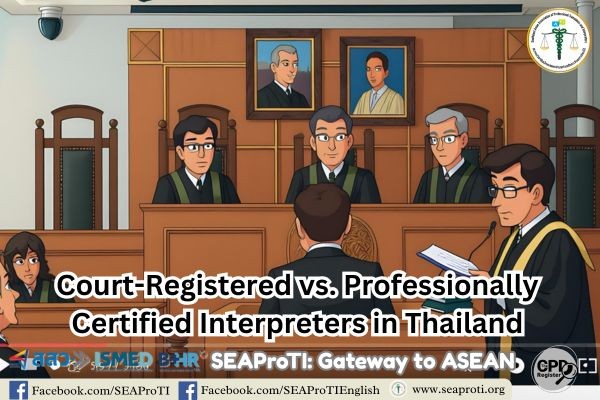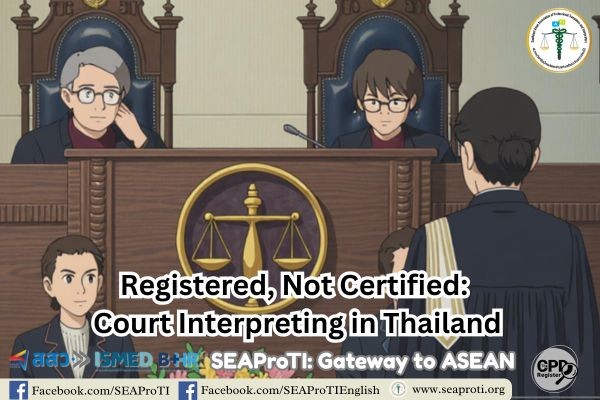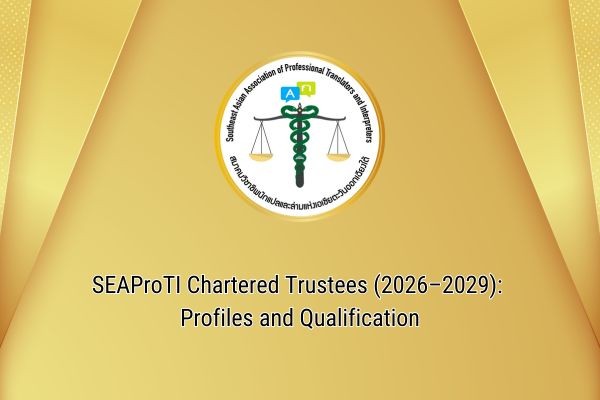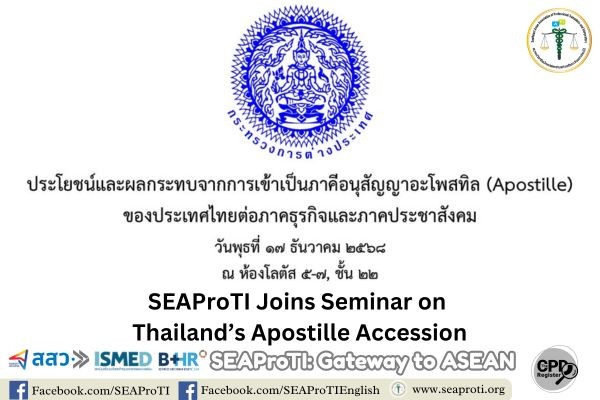The Crisis of Thai Interpreters in 2024: A Profession Undermined from Within
January 2, 2025, Bangkok – In a world where seamless communication knows no borders, interpreters play a pivotal role in bridging cultures and fostering understanding between languages. However, in Thailand, the year 2024 has marked a turning point for the interpreter profession, which has faced harsh criticism due to issues ranging from subpar interpreting quality and unfair compensation to a widespread lack of professional ethics.
Even more alarming is the absence of robust legal frameworks to regulate and oversee the profession. This void has left interpreters vulnerable to exploitation, mental health issues, and unsafe working conditions. If these challenges remain unaddressed, 2025 may be the year when the interpreter profession in Thailand collapses entirely.
This article delves into the pressing issues plaguing the field, examines the potential consequences, and highlights the urgency for reform to preserve the integrity of a profession vital to cross-cultural communication.
Compromised Quality: A Risk to Service Users
In 2024, the failure to meet interpreting standards in Thailand has caused significant harm to critical sectors, including the judicial system. Instances of inaccurate interpretations by unqualified interpreters have delayed court proceedings (Justice delayed is justice denied), costing service users valuable time and opportunities.
Government agencies and organizations, expected to lead by example in hiring qualified interpreters, have often neglected to uphold standards. This neglect has led to miscommunication, misinformation, and a tarnished reputation for a profession once revered as the bridge of cross-cultural understanding.
Exploitation of Labor: When Interpreters Become Victims of the System
Thai interpreters have been subjected to shockingly low wages, with some earning as little as 300–800 THB per day—barely minimum wage and far from sufficient to cover basic living expenses. Classified as “freelancers,” they are excluded from essential benefits such as health insurance and workplace protections.
Many employers avoid hiring full-time interpreters, citing a lack of adequate skills among candidates. When interpreters are hired, employers often invest heavily in training only for interpreters to leave for higher-paying roles once their skills improve, creating a cycle of instability.
A Dangerous Profession: When Safety is Sacrificed
Interpreters often face unsafe working conditions. Some are forced to accept jobs in hazardous environments, such as factories with high injury risks or in illicit “grey area” businesses, simply to make ends meet. These scenarios underscore the absence of protections for interpreters in Thailand, exposing them to physical and legal dangers.
Mental Health Collapse: The Hidden Cost of Interpreting
Interpreters are increasingly reporting mental health issues stemming from their work. Recent studies reveal that 41–76% of interpreters experience moderate to severe stress due to overwhelming demands, including unrealistic expectations and the stigma of not meeting professional standards. Many are terminated during probation periods because their skills fail to meet employer expectations, exacerbating their psychological burdens.
“Scammers in Disguise”: The Damage of Pseudo-Interpreters
One of the most alarming threats to the profession is the rise of scammers posing as professional interpreters. These individuals exploit employers’ lack of language knowledge, delivering inaccurate interpretations for personal gain. They often target small-scale employers who cannot verify their credentials. This malpractice not only deceives clients but also irreparably damages the credibility of the interpreting profession.
Regulatory Failure: Who Will Take Responsibility?
While international organizations like the Registry of Interpreters for the Deaf (RID) in the U.S. enforce strict ethical standards, including penalties such as certification suspension or revocation, Thailand lacks any comparable oversight. This absence allows interpreters to operate outside the bounds of accountability, refusing to join associations or adhere to professional codes of conduct.
2025 Implications: A Looming Crisis
Without legal frameworks to regulate and oversee interpreters, Thailand faces severe consequences in 2025:
- Judicial System Breakdown: Misinterpretations in courtrooms or investigations could lead to delays or wrongful case dismissals.
- Economic Fallout: Loss of confidence in Thai interpreters by international businesses could cost the country valuable economic opportunities.
- National Security Risks: Unregulated interpreters could become entangled in illicit activities, jeopardizing the nation’s safety.
- Professional Collapse: The profession’s declining credibility may render it unsalvageable.
Conclusion: Is Reform Still Possible?
The events of 2024 serve as a dire warning of the interpreter profession’s deteriorating state in Thailand. Without urgent reforms to establish professional standards, enforce regulations, and protect workers, 2025 may mark the total collapse of this critical field. It is time for all stakeholders—governments, professional associations, and interpreters themselves—to collaborate in restoring stability, credibility, and value to the interpreter profession before it is too late.
About SEAProTI’s certified translators, translation certification providers, and certified interpreters:
The Southeast Asian Association of Professional Translators and Interpreters (SEAProTI) has officially announced the criteria and qualifications for individuals to register as “Certified Translators,” “Translation Certification Providers,” and “Certified Interpreters” under the association’s regulations. These guidelines are detailed in Sections 9 and 10 of the Royal Thai Government Gazette, issued by the Secretariat of the Cabinet under the Office of the Prime Minister of the Kingdom of Thailand, dated July 25, 2024, Volume 141, Part 66 Ng, Page 100.
To read the full publication, visit: the Royal Thai Government Gazette
วิกฤตล่ามไทย 2567: เมื่อวิชาชีพล่ามไทยตกต่ำและถูกทำลายจากคนในแวดวง
2 มกราคม 2568, กรุงเทพ – ในโลกที่การสื่อสารไร้พรมแดนมีบทบาทสำคัญ วิชาชีพล่ามควรเป็นรากฐานที่มั่นคงในการเชื่อมโยงวัฒนธรรมและสร้างความเข้าใจระหว่างภาษาต่างๆ แต่ในประเทศไทย ปี 2567 กลับกลายเป็นปีที่ภาพลักษณ์ของล่ามต้องเผชิญกับการวิพากษ์วิจารณ์อย่างหนัก ตั้งแต่ปัญหาคุณภาพการแปล ค่าตอบแทนที่ไม่เป็นธรรม ไปจนถึงการขาดจรรยาบรรณวิชาชีพ
ที่น่ากลัวไปกว่านั้น คือการขาดกฎหมายกำกับดูแลที่ชัดเจน ทำให้ล่ามจำนวนมากต้องตกอยู่ในระบบที่ไร้การปกป้อง ทั้งด้านสิทธิแรงงาน สุขภาพจิต และความปลอดภัยในการทำงาน หากสถานการณ์นี้ยังคงดำเนินต่อไปโดยไร้การแก้ไข ปี 2568 อาจกลายเป็นจุดแตกหักที่พาอาชีพล่ามไทยไปสู่หายนะ
ในบทความนี้ เราจะเจาะลึกปัญหาที่กำลังเผชิญอยู่ วิเคราะห์ผลกระทบที่อาจเกิดขึ้น และชี้ให้เห็นว่าหากไม่มีการเปลี่ยนแปลงอย่างเร่งด่วน วิชาชีพที่มีบทบาทสำคัญนี้อาจสูญเสียความน่าเชื่อถือไปตลอดกาล
คุณภาพที่ถูกตั้งคำถาม: ความเสี่ยงของผู้ใช้บริการ
การละเมิดมาตรฐานวิชาชีพล่ามในประเทศไทยในปี 2567 สร้างความเสียหายต่อกระบวนการยุติธรรมและบริการสำคัญต่างๆ ของประเทศ ตัวอย่างชัดเจนคือการแปลผิดพลาดจากล่ามที่ไม่มีคุณสมบัติเพียงพอ ซึ่งบ่อยครั้งเป็นเหตุให้เกิดความล่าช้าในกระบวนการพิจารณาคดี (Justice delayed is justice denied) และทำให้ผู้ใช้บริการเสียทั้งเวลาและโอกาสสำคัญในชีวิต
หน่วยงานราชการและองค์กรต่างๆ ซึ่งควรเป็นต้นแบบในการใช้บริการล่ามที่มีคุณภาพ กลับละเลยมาตรฐาน ส่งผลให้เกิดการบิดเบือนข้อมูล การแปลที่ผิดพลาด และการเสียหายต่อภาพลักษณ์ของวิชาชีพที่ครั้งหนึ่งเคยได้รับการยกย่องว่าเป็นสะพานเชื่อมโยงความเข้าใจระหว่างวัฒนธรรม
แรงงานไร้สิทธิ: เมื่อ “ล่าม” กลายเป็น “เหยื่อ” ของระบบ
ล่ามในประเทศไทยถูกกดขี่ด้วยค่าจ้างที่ต่ำจนน่าอับอาย โดยบางแห่งจ่ายค่าตอบแทนต่ำถึง 300-800 บาทต่อวัน ซึ่งเรียกง่าย ๆ คือ ค่าจ้างขั้นต่ำของแรงงาน ซึ่งไม่เพียงพอสำหรับความเป็นอยู่พื้นฐาน นอกจากนี้ ล่ามยังถูกจัดประเภทเป็น “ผู้รับจ้างอิสระ” ที่ปราศจากสิทธิประโยชน์ เช่น การประกันสุขภาพและสวัสดิการที่จำเป็น
นายจ้างจำนวนไม่น้อยปฏิเสธการจ้างงานล่ามประจำ เพราะเห็นว่าล่ามจำนวนมากไม่มีความสามารถที่แท้จริง และเมื่อมีการจ้างงาน ก็ต้องลงทุนในการฝึกฝนอย่างหนัก แต่เมื่อความสามารถของล่ามพัฒนาขึ้น พวกเขากลับย้ายงานเพื่อหาค่าจ้างที่สูงขึ้น ทั้งที่ทักษะอาจไม่ได้เพิ่มขึ้นตามความคาดหวัง
ความเสี่ยงในชีวิต: เมื่อ “งานล่าม” ไม่ได้ปลอดภัยอีกต่อไป
ล่ามจำนวนมากถูกบีบให้รับงานในสภาพแวดล้อมที่เสี่ยงอันตราย เช่น โรงงานที่มีความเสี่ยงต่อการบาดเจ็บ หรือธุรกิจสีเทาที่อาจนำไปสู่ความเสียหายทางกฎหมายและชื่อเสียง ความไม่ปลอดภัยในวิชาชีพนี้เป็นเครื่องยืนยันว่าล่ามไทยไม่ได้รับการปกป้องจากภาครัฐและนายจ้างอย่างที่ควร
สุขภาพจิตล่มสลาย: ภาระที่หนักเกินไปของวิชาชีพล่าม
ความเครียดและความกดดันที่ล่ามต้องเผชิญกลายเป็นปัญหาสุขภาพจิตที่ลุกลาม รายงานล่าสุดเผยว่า 41-76% ของล่ามประสบปัญหาความเครียดในระดับปานกลางถึงรุนแรง จากการถูกกดดันให้ทำงานเกินความสามารถและการถูกปฏิเสธไม่ผ่านทดลองงาน เนื่องจากไม่สามารถปฏิบัติงานได้ตามมาตรฐาน
“มิจฉาชีพในคราบล่าม”: กับดักที่สร้างความเสียหาย
หนึ่งในภัยร้ายแรงที่สุดที่แฝงตัวในวิชาชีพล่ามไทยคือ “มิจฉาชีพ” ที่แอบอ้างตัวเป็นล่ามมืออาชีพ พวกเขาหลอกลวงนายจ้างที่ไม่มีความรู้ด้านภาษา โดยแปลมั่วเพื่อผลประโยชน์ส่วนตัว และมักเลือกทำงานกับนายจ้างระดับล่างที่ไม่สามารถตรวจสอบคุณภาพได้อย่างเหมาะสม นี่คือการทำลายความน่าเชื่อถือของวิชาชีพล่ามที่ไม่สามารถฟื้นคืนได้ง่ายๆ
ความล้มเหลวของการกำกับดูแล: ใครจะรับผิดชอบ
ในต่างประเทศ สมาคมล่าม เช่น สมาคมล่ามภาษามือแห่งสหรัฐอเมริกา (RID) มีมาตรการลงโทษล่ามที่ละเมิดมาตรฐานจริยธรรม เช่น การพักใบอนุญาตหรือเพิกถอนการรับรอง แต่ในประเทศไทย กลับไม่มีระบบการควบคุมที่เข้มงวด ทำให้ล่ามจำนวนมากปฏิเสธที่จะเข้าสังกัดสมาคมหรือปฏิบัติตามจรรยาบรรณวิชาชีพ
ผลกระทบในปี 2568: วิกฤตที่รอวันปะทุ
หากประเทศไทยยังคงไม่มี กฎหมายควบคุมและกำกับดูแลล่าม ผลกระทบที่รุนแรงยิ่งขึ้นอาจเกิดขึ้นในปี 2568 และส่งผลกระทบในหลายด้าน เช่น:
- กระบวนการยุติธรรมที่หยุดชะงัก: การแปลผิดในชั้นศาลหรือการสืบสวนคดีอาจทำให้เกิดความล่าช้าหรือคดีถูกยกฟ้อง
- ความเสียหายต่อเศรษฐกิจ: ธุรกิจระหว่างประเทศที่พึ่งพาล่ามอาจสูญเสียความเชื่อมั่น ส่งผลให้ประเทศไทยสูญเสียโอกาสทางเศรษฐกิจในระดับโลก
- ความเสี่ยงต่อความมั่นคงของชาติ: ล่ามที่ไม่มีมาตรฐานอาจถูกใช้ในธุรกิจสีเทาหรือกิจกรรมที่ผิดกฎหมาย ซึ่งอาจส่งผลกระทบต่อความปลอดภัยของประเทศ
- การล่มสลายของวิชาชีพ: ความน่าเชื่อถือของวิชาชีพล่ามจะเสื่อมถอยจนยากที่จะกู้คืนกลับมา
บทสรุป: ถึงเวลาเปลี่ยนแปลงหรือไม่
สถานการณ์ที่เกิดขึ้นในปี 2567 เป็นสัญญาณเตือนถึงวิกฤตในวิชาชีพล่ามไทย หากไม่มีการยกระดับมาตรฐานวิชาชีพ การบังคับใช้กฎหมาย และการกำกับดูแลที่เหมาะสม ปี 2568 อาจเป็นปีแห่งการล่มสลายของวิชาชีพล่ามในประเทศไทย ถึงเวลาแล้วที่ทุกฝ่ายจะต้องร่วมมือกันเพื่อรักษาและฟื้นฟูวิชาชีพนี้ให้กลับมามีความมั่นคงและความน่าเชื่อถืออีกครั้ง
เกี่ยวกับนักแปลรับรอง ผู้รับรองการแปล และล่ามรับรองของสมาคมวิชาชีพนักแปลและล่ามแห่งเอเชียตะวันออกเฉียงใต้
สมาคมวิชาชีพนักแปลและล่ามแห่งเอเชียตะวันออกเฉียงใต้ (SEAProTI) ได้ประกาศหลักเกณฑ์และคุณสมบัติผู้ที่ขึ้นทะเบียนเป็น “นักแปลรับรอง (Certified Translators) และผู้รับรองการแปล (Translation Certification Providers) และล่ามรับรอง (Certified Interpreters)” ของสมาคม หมวดที่ 9 และหมวดที่ 10 ในราชกิจจานุเบกษา ของสำนักเลขาธิการคณะรัฐมนตรี ในสำนักนายกรัฐมนตรี แห่งราชอาณาจักรไทย ลงวันที่ 25 ก.ค. 2567 เล่มที่ 141 ตอนที่ 66 ง หน้า 100 อ่านฉบับเต็มได้ที่: นักแปลรับรอง ผู้รับรองการแปล และล่ามรับรอง


